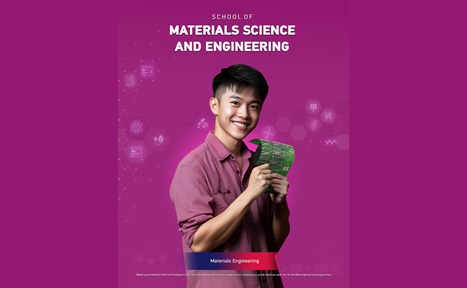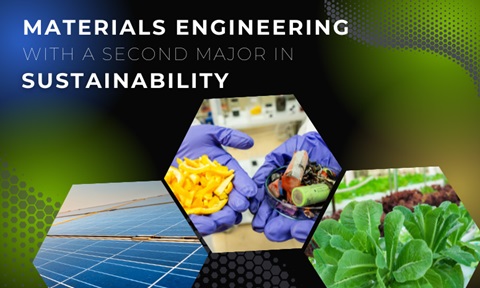NTU MSE degrees are recognised worldwide and accredited by the Engineering Accreditation Board
1st
worldwide in the 2022 US News Best Global Universities Rankings for Materials Science
Top 10
in the world according to the 2023 QS World University Rankings for Materials Science
Largest
materials engineering school in the world
Materials for today's industry and for the future economy
Undergraduate programmes
View moreMSE Chair Scholars Program

The MSE Chair Scholars Programme (CSP) is designed to provide top students in School of Materials Science and Engineering a holistic development pathway to help them excel academically and inculcate desired attributes of a future engineer. With MSE’s robust curriculum, the structured programme will offer diverse opportunities to expose scholars to cutting-edge research, as well as industry practices and trends. It will develop their leadership skills and raise cultural awareness, while receiving mentorship and guidance on their academic journey. Upon successful completion of programme, students will be awarded a certificate of achievement with title of MSE Chair Scholar.
Eligibility
Benefits of Award
- Research attachments with MSE professors
- Travel grant of up to SG$2,500 to attend an overseas research conference
- Priority access to top internship companies
- Career coaching
- Mentorship by MSE senior leader professors
- Personalised academic guidance
- Guaranteed overseas learning journey with full subsidy
- Student ambassadorship
Terms and Conditions
- Student can concurrently hold CSP with NTU and non-NTU scholarships, excluding PSP programs.
- Maintain a cumulative grade point average (CGPA) of 3.5.
- Fulfil 40 hours of student ambassadorship over four years.
- Complete all components of the programme.
Selection Interview
Graduate programmes
View allMaster of Engineering (Research) | Materials Science and Engineering
They are:
| Full-Time | Part-Time | ||
Programmes | Minimum | Maximum | Minimum | Maximum |
Master of Engineering (M.Eng.) | 1 year | 3 years | 1 year | 3 years |
- Biomaterial and Biomedical Devices
- Computational Materials Science
- Defence Materials
- Functional Materials and Composites
- Materials for Sustainability
- Nanoelectronics, Nanomaterials and Multiferroics
- Applicants from overseas universities must have a relevant Bachelor’s degree with at least 2nd Upper Honours or better.
- Applicants from universities in China must have an average grade of 80 or above for the relevant Bachelor’s degree.
- Applicants from universities in India must have 1st Class Honours for the relevant Bachelor’s degree.
All applicants from overseas universities must provide GRE and TOEFL scores. Applicants from India may use GATE to replace GRE. IELTS may be used in place of TOEFL.
- 600 for paper-based test
- 250 for computer-based test
- 100 for internet-based test
- M.Eng. - 9 Academic Units with an average grade of B- or CGPA of 3.0
2. Thesis & Oral Examination:
At the end of the programme, both Ph.D. and M.Eng. are required to write and submit a thesis, which will be examined by internal and external examiners. After which, students have to conduct an Oral Examination.
The following modules are offered under the MEng by research program.
- MS6003 - Failure Analysis of Engineering Materials (Civil & Mechanical)
- MS6006 - Failure Analysis in Semiconductor Packaging
- MS6007 - Carbon Markets 101: Strategies for a Low-Carbon Future
- MS6020 - Fundamentals of Intellectual Property in Materials Science & Engineering
- MS6021 - Application of Patents & Registered Design in Engineering Related Industries
- MS6022 - Appreciating IP in Research & Development
- MS7001 - Materials Laboratory Techniques
- MS7014 - Mechanical Properties of Polymers, Biomaterials & Composites
- MS7025 - Biological and Bio-Inspired Materials
- MS7027 - Advanced Methods In Polymer Characterization
- MS7052 - Surface and Colloids
- MS7055 - Magnetic Materials
- MS7056 - Optical Materials
- MS7072 - Principles and Applications of Solid State NMR
- MS7073 - Introduction to Quantum Physics
- MS7074 - Designing Materials for Biomedical Engineering
- MS7075 - Bridging Sustainability & Materials Science: A New Paradigm
- MS7110 - History of Materials
- MS7120 - Inorganic Materials
- MS7130 - Organic Materials
- MS7140 - Properties of Materials
- MS7210 - Processing of Inorganic Materials
- MS7220 - Processing and Processability of Organic Materials (Polymers)
- MS7240 - Modelling of Materials
- MS7310 - Chemical Analysis of Materials
- MS7320 - Physical Analysis of Materials
- MS7330 - Electron Microscopy of Materials
- MS7340 - Crystal Chemistry of Materials
- MS7410 - Nanomaterials
- MS7420 - Biomaterials
- MS7430 - Electronic Materials and Devices
- MS7440 - Environmental and Thermal Degradation of Polymeric Materials
- MS7450 - Advanced Topics in Biomaterials
- MS7460 - Polymer Recycling & Sustainable Polymeric Materials
- MS7470 - Nanostructured Materials for Healthcare
- MS7480 - Polymer Properties, Design & Sustainability
Please click here to view more detailed information of the postgraduate courses.
- Engineering
- Full-time
- Part-time
- Master (Research)
- AY2019/2020
- College of Engineering
- School of Materials Science and Engineering













